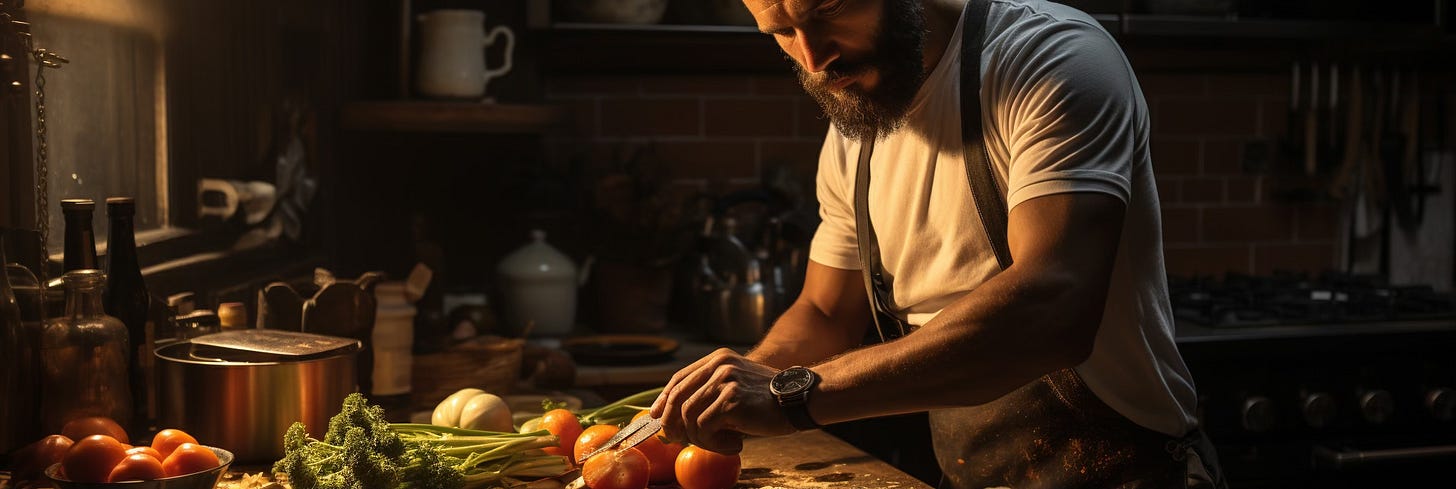The first time I held a chef's knife with real purpose was not in a moment of culinary ambition, but of desperate love.
Claudia's cancer diagnosis came like a sudden, brutal cut—slicing through the familiar landscape of our life together. In an instant, everything changed. She, who had always been our household's culinary artist, now lay exhausted on the couch, her strength stolen by chemotherapy's relentless assault. The Eagle Scout in me—trained in survival skills, confident in wilderness cooking over an open fire—suddenly felt utterly inadequate in our small kitchen.
My initial attempts were comically tragic. Boiling was my baseline—the one cooking skill I'd mastered during camping trips. Barbecue was my other culinary domain, where fire and meat met with predictable masculinity. But now, facing the delicate task of preparing nutritious meals for my fragile wife, I discovered how little I actually knew about feeding someone back to health.
Each cut was a lesson in vulnerability. A dull knife tears rather than separates, requiring more force and creating more damage. I learned this not from a cooking class, but from watching Claudia's body—how harshly treatment could wound, how precisely care needed to be administered.
My mentor, Reverend Chuck Simmons, a Methodist pastor who had guided me through the wilderness of my early spiritual formation, once told me that true care is never about grand gestures, but about persistent, attentive presence. "Ministry," he would say, "is learning to cut cleanly—separating what harms from what heals, without destroying the essential integrity of what you're touching."
Those words echoed in my kitchen as I slowly, painfully learned to chop, to slice, to create meals that might offer Claudia not just nutrition, but a small moment of comfort.
Grief and learning intertwined. Each vegetable became a meditation. Each careful slice a prayer. I learned that cooking, like spiritual formation, is about transformation—taking raw, disconnected ingredients and creating something that sustains life.
Claudia did not survive her cancer. But the lessons learned in that kitchen became a form of continued love—a way of honoring her by continuing to learn, to care, to create.
The Anatomy of a Clean Cut
In cooking, a clean cut preserves the integrity of what you're preparing. When you slice through a tomato with a sharp knife, you see the cellular structure, the inner life of the fruit. A dull knife crushes and tears, obscuring that delicate inner world.
So too with spiritual discernment. The goal isn't to wound or divide, but to see more clearly. To recognize the intricate systems of meaning, the complex human experiences that lurk beneath surface-level conflicts.
This is particularly crucial in our current moment of profound social and theological division. MAGA Christianism represents a form of spiritual dullness—an approach that tears and crushes rather than carefully distinguishes. It uses blunt ideological instruments where precision is required.
Learning to Cut Differently
Sajeena, my beloved wife, has been my greatest teacher in this practice of careful cutting. A physician whose work requires both technical precision and deep compassion, she moves through complex human situations with an extraordinary blend of clarity and care.
I've watched her listen to patients, cutting through medical complexity with a combination of scientific rigor and human tenderness. She doesn't deny difficulty, but neither does she let difficulty define the entire narrative. She's taught me that it's all about finding the margins where targeted love can penetrate difficult spaces. Each interaction is a kind of spiritual surgery—separating what harms from what heals.
The Spiritual Vegetables of Discernment
Years later, as I stand in the kitchen with my bonus children, teaching them how to hold a knife, how to move with intention and care, I realize this is deeper than cooking. I'm teaching them about presence. About paying attention. About the sacred art of transformation.
My 15-year-old, who's already become skilled in the kitchen, recently told me, "Beau Père, I never knew cooking could be so meditative." I smiled, thinking of that cancer kitchen, of Chuck Simmons, of my surgeon wife, and of all the mentors who've taught me how to cut cleanly through life's complexity.
In our garden, I've learned that how you prepare vegetables matters as much as how you grow them. A carelessly chopped vegetable loses flavor, nutritional integrity. But when prepared with intention, even the simplest ingredients reveal extraordinary complexity.
Spiritual discernment is similar. It's not about eliminating complexity, but about revealing it. About creating space for nuance, for the kind of understanding that heals rather than wounds.
This is the practice of participatory freedom—creating space for genuine human flourishing by moving with precision, care, and a commitment to seeing more deeply.
My knife skills have become a meditation. Each careful slice a prayer. Each moment of precision an act of love.
---
What practices help you cultivate care and discernment? I'd love to hear your reflections in the comments.



